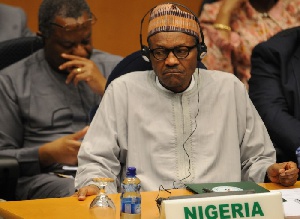 President Buhari has a full plate on security issues
President Buhari has a full plate on security issues
Gunmen have abducted schoolgirls in northwest Nigeria’s Zamfara state, a state spokesman said on Friday.
The incident is the second such kidnapping in just over a week and the third since December in Nigeria’s north, where a surge in armed militancy has led to a widespread breakdown of security.
There is growing public anger over the violence, prompting President Muhammadu Buhari to replace his military high command last month.
Following are details on the violence affecting different regions.
BANDITS, NORTHWEST/NORTH-CENTRAL NIGERIA
Armed gangs that rob and kidnap for ransom, commonly described as “bandits”, are active across the northwest.
Such groups killed more than 1,100 people in the first half of 2020 alone, according to rights group Amnesty International.
The Zamfara state kidnappings came just over a week after gunmen in north-central Niger state killed a student and kidnapped 42 people at a boarding school. Those kidnapped remain missing.
In December, gunmen abducted 344 boys from a boarding school in northwestern Katsina state. They were released roughly a week later. While Islamist militants Boko Haram claimed responsibility, sources later said the adduction was spurred by inter-communal feuding.
Amnesty said it had “documented an alarming escalation in attacks and abductions” since January.
The banditry has made it difficult, and in some cases impossible, to farm, travel or tap some states’ rich mineral assets, such as gold.
INSURGENTS, NORTHEAST NIGERIA
Boko Haram and its Islamic State offshoot, Islamic State West Africa Province, have waged a decade-long insurgency in northeastern Nigeria.
The violence has displaced about 2 million people and killed more than 30,000, according to the United Nations refugee agency and the Council on Foreign Relations (CFR), a New York-based think tank.
This week, suspected Islamist insurgents pounded the biggest city in the region, Maiduguri, with rocket-propelled grenades, killing at least 10 and injuring dozens in the worst attack in a year on the city.
In November, Boko Haram killed scores of farmers, beheading some of them, in Borno state.
FARMER-HERDER CLASHES, MIDDLE BELT
Clashes between nomadic cattle herders and farmers in Nigeria’s Middle Belt have killed thousands of people and displaced half a million over the past decade, according to estimates from French medical charity Medecins Sans Frontieres.
In the past, authorities have blamed the violence on religion or ethnic divisions, but locals say the groups are fighting for access to fertile land and water. [reut.rs/3agztKy]
Experts fear the conflict will become worse as global warming intensifies competition for scarce resources.
PROTESTS AGAINST POLICE BRUTALITY, NATIONWIDE
What began as largely peaceful protests against police brutality turned violent in October after security forces fired on demonstrators, according to witnesses and Amnesty.
At least 10 people were killed in the upscale Lagos neighourhood of Lekki on Oct. 20, Amnesty said. The army and police denied shooting protesters there and have said their actions during the protests kept the nation safe.
In the days that followed, rioting, looting and lawlessness broke out across the country. It was the worst unrest in Nigeria since the end of military rule in 1999.
PIRACY, VANDALISM AND THEFT IN NIGER DELTA
Turmoil and lack of economic development in the oil-producing Niger Delta region have sparked insecurity on land and at sea.
Pirate attacks in the Gulf of Guinea, most of whom are based in Nigeria, hit a record last year, according to the International Maritime Bureau. It warned that well-armed and violent gangs are marauding further out to sea.
In January, pirates killed one sailor and kidnapped fifteen.
Kidnappings are also common on land, and last year, oil companies stepped up security for their installations.